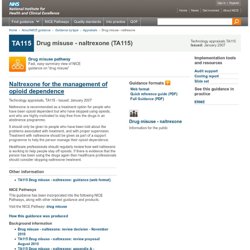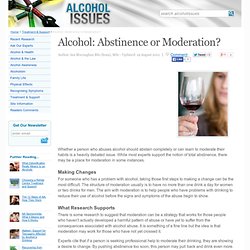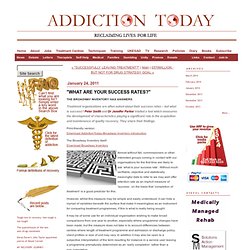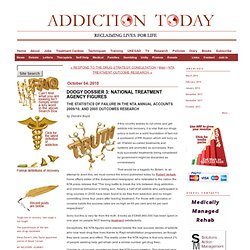

Drug misuse - naltrexone. Naltrexone is recommended as a treatment option for people who have been opioid dependent but who have stopped using opioids, and who are highly motivated to stay free from the drugs in an abstinence programme.

It should only be given to people who have been told about the problems associated with treatment, and with proper supervision. Treatment with naltrexone should be given as part of a support programme to help the person manage their opioid dependence. Healthcare professionals should regularly review how well naltrexone is working to help people stay off opioids. If there is evidence that the person has been using the drugs again then healthcare professionals should consider stopping naltrexone treatment.
Other information. Methadone Maintenance and Patients in Alcoholism Treatment -Alcohol Alert No. 01-1988. 151-160.pdf (application/pdf Object) Radical Approach To Drugs Recovery Piloted, UK. Alcohol Abstinence Vs. Moderation, From The Harvard Mental Health Letter. Alcohol abstinence vs. moderation - MSN Health & Fitness - Addiction. Alcohol: Abstinence or Moderation? - Alcohol Issues. Author: Ian Murnaghan BSc (hons), MSc - Updated: 19 August 2012| Comment Whether a person who abuses alcohol should abstain completely or can learn to moderate their habits is a heavily debated issue.

While most experts support the notion of total abstinence, there may be a place for moderation in some instances. Making Changes For someone who has a problem with alcohol, taking those first steps to making a change can be the most difficult. What Research Supports There is some research to suggest that moderation can be a strategy that works for those people who haven't actually developed a harmful pattern of abuse or have yet to suffer from the consequences associated with alcohol abuse. Experts cite that if a person is seeking professional help to moderate their drinking, they are showing a desire to change. An important distinction must be made between those who are dependent and those who have identified problems with their pattern of alcohol use. Predicting Who it Helps @Ginni. The Alcohol Abstinence Cheat Sheet.
Nta_review_of_the_effectiveness_of_treatment_for_alcohol_problems_fullreport_2006_alcohol2.pdf (application/pdf Object) Video: Annette Dale-Perera on the International Treatment Effectiveness Project - by FEAD. Addiction Today: "WHAT ARE YOUR SUCCESS RATES?" Treatment organisations are often asked about their success rates – but whatis success?

Peter Smith and Dr Jennifer Parker trialled a tool which measures the development of characteristics playing a significant role in the acquisition and maintenance of quality recovery. They share their findings. Print-friendly version:Download AddictionToday-Broadway Inventory introduction The Broadway Inventory itself:Download Broadway Inventory Almost without fail, commissioners or other interested groups coming in contact with our organisations for the first time are likely to ask ‘what is your success rate’. However, whilst this measure may be simple and easily understood, it can hide a myriad of variables beneath the surface that make it meaningless as an instrument for comparing treatment programmes, if this is what is really being sought.
With this background in mind we began to explore ways of identifying the impact of our treatment approach on the individuals we were working with. Procedure. Addiction Today: DODGY DOSSIER 3: NATIONAL TREATMENT AGENCY FIGURES. By Deirdre Boyd If this country wishes to cut crime and get addicts into recovery, it is vital that our drugs policy is built on a solid foundation of fact not a quicksand of PR illusion which will bury us all.

If failed so-called treatments and systems are promoted as successes, then truly successful treatments being considered by government might be discarded as unnecessary. That would be a tragedy for Britain. In an attempt to avert this, we must correct the errors published today by Robert Verkaik, home affairs editor of the Independent newspaper, who reiterated to the nation the NTA press release that "The long battle to break the link between drug addiction and criminal behaviour is being won.
Nearly a half of all addicts who participated in drug courses in 2005 have been found to be free from addiction and no longer committing crime four years after leaving treatment. Recovery Communities Grow - Personal Blog - Wired In. Alcohol Abuse, Drug Abuse, Drug Addiction, Eating Disorder (anorexia, bulimia, binge eating) - or similar problem? Help, advice & information is here. RSA-Whole-Person-Recovery-report.pdf (application/pdf Object)